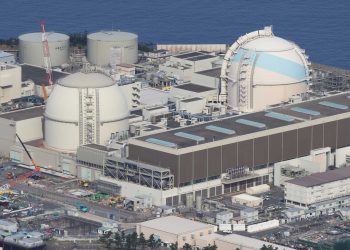,
Washington (AFP): Four days after a landmark nuclear accord with North Korea, an independent US report warned Friday that the Stalinist state's leader, Kim Jong-Il, continues to distrust Washington and views US aid as a “poison apple.” The report by an influential panel of Asia specialists also ruled out the possibility of Kim emulating China's former paramount leader Deng Xiaoping in embracing economic reforms to open up reclusive and impoverished North Korea.
“Our conclusion is that the Kim regime would prefer to muddle through, despite the dim future for 21 million North Koreans, than to take the risk of opening up a la Deng Xiaoping,” said the report, “US-Japan Alliance: Getting Asia Right Through 2020.”
“Thus, the often-touted 'Grand Bargain' is likely to remain elusive because Kim Jong-Il harbors deeply ingrained distrust of the United States and tends to view proffered US economic incentives as a 'poison apple,'” said the panel co-chaired by former US deputy secretary of state Richard Armitage.
Some experts have previously proposed a “grand bargain” by which the United States and its allies could defuse North Korea's military threat through deeper North Korean reforms and weapons cuts in exchange for more Western and regional aid and recognition.
The report Friday highlighted major trends in Asia, and provided the bipartisan panel's analysis with security and economic policy recommendations.
But the chapter on North Korea painted a largely pessimistic picture despite a breakthrough deal with Pyongyang at six-party talks in Beijing last Monday that Washington has touted as a first step towards stripping the Stalinist regime of any nuclear weapons.
Under the deal reached at the talks among the United States, China, the two Koreas, Japan and Russia, Kim's regime would have 60 days to shut down its main Yongbyon nuclear reactor and allow United Nations nuclear inspectors back into the country.
The energy-starved regime would in turn receive a first tranche of 50,000 tonnes of fuel oil — part of an eventual one million tonnes and additional diplomatic, security and other guarantees if it permanently disables its key nuclear facilities.
Previously, North Korea agreed at six-way talks in September 2005 to scrap its atomic plans but then boycotted the negotiations for over a year and defiantly conducted a nuclear weapons test.
Earlier agreements foundered on disputes between Washington and Pyongyang.
“It is possible that North Korea could implement a six-party agreement, but that remains difficult to imagine given its behavior to date,” the report said.
David Asher, a former coordinator on North Korea policy at the State Department and a member of the panel that crafted the report, said Pyongyang reportedly continued to counterfeit American currency as part of that “behavior.”
“North Korea is not going to voluntarily back out of the dark side of their system,” Asher said, adding that he strongly doubted the communist regime would abandon its “illicit” financial activities. “For them, it's the best side of the system.”
The report forecast that North Korea could give up its nuclear weapons only after reunification with South Korea, which it said could take place before 2020.
North and South Korea have remained technically at war since the 1950-53 conflict ended without a peace treaty. In the war, the United States backed the South, with which it continues to have a military alliance.
“It appears increasingly likely that the North Korean nuclear problem will be finally resolved only upon reunification, perhaps in a manner similar to that of Ukraine after the collapse of the Soviet Union,” the report said.
It urged the United States and Japan to be prepared for all scenarios of reunification — including one in which there would be instability in North Korea — that would require “unprecedented agility in diplomacy and deterrence.”









